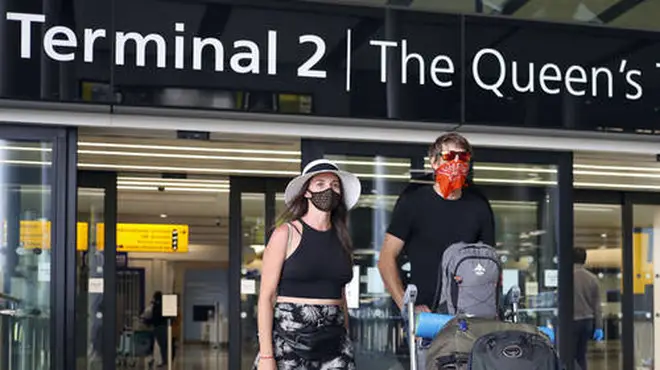
James O'Brien 10am - 1pm
5 November 2020, 17:12 | Updated: 6 November 2020, 10:18

Denmark has been added to the government's quarantine list of countries because of widespread outbreaks of Covid-19 at mink farms.
Travellers arriving in the UK from the country after 4am on Friday must self-isolate for 14 days.
Grant Shapps said in a statement the decision came as Danish health authorities had reported "widespread" outbreaks at mink farms and a "variant strain" of the virus was spreading to local communities.
He said: "I understand that this will be concerning for both people currently in Denmark and the wider UK public, which is why we have moved quickly to protect our country and prevent the spread of the virus to the UK."
"While new lockdown rules mean leaving home in order to travel for holidays is no longer permitted, the government's travel corridor policy remains a critical part of the Government's Covid-19 response as it mitigates the risk of importing infections from abroad."
Sweden and Germany were also added to the Government's coronavirus quarantine measures.
Denmark was only added to the quarantine-free list on October 25.
The move comes just hours after Germany and Sweden were removed from the list, with people travelling to the UK from those destinations to quarantine for two weeks if they arrive after 4am on Saturday.
We are removing SWEDEN and GERMANY from the Travel Corridor list. From 4am Saturday 7th November, if you arrive into the UK from these destinations you will need to self-isolate. All arriving passengers should complete a passenger locator form on arrival.
— Rt Hon Grant Shapps MP (@grantshapps) November 5, 2020
Germany's seven-day rate of coronavirus cases per 100,000 people reached 140 after nearly 20,000 cases were reported on Wednesday.
The rate for Sweden is 190.
Figures have been calculated on data collected by the European Centre for Disease Prevention and Control.
The Government is believed to be using a rate of 100 as the threshold above which it considers triggering quarantine conditions. This is up from 20 in recent months.
The UK's own rate is 235.
Mr Shapps has launched a taskforce to develop methods of reducing the 14-day self-isolation period for people arriving from non-exempt locations.
He said the Government was considering a "test and release regime" which would still involve a quarantine period of at least a week.
The decision comes following concerns over rising numbers of coronavirus cases in these destinations.
Secretary of State for Transport Grant Shapps shared the latest changes on Twitter.
The Department for Transport said: "Germany and Sweden have been removed from the list of UK travel corridors, having been assessed by the Joint Biosecurity Centre as posing a heightened infection risk.
"Passengers arriving into the UK from Germany and Sweden from 4am on Saturday November 7 2020 will need to self-isolate for two weeks before then following domestic rules.
"The Government's travel corridor policy remains a critical part of the Government's Covid-19 response as it mitigates the risk of importing infections from abroad; this has not changed following the introduction of new restrictions in England."